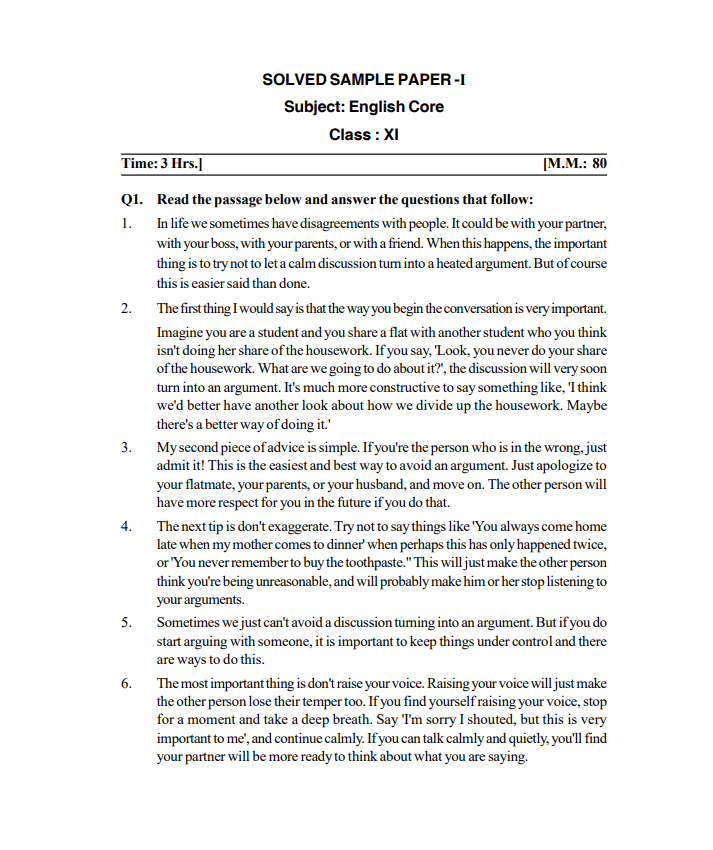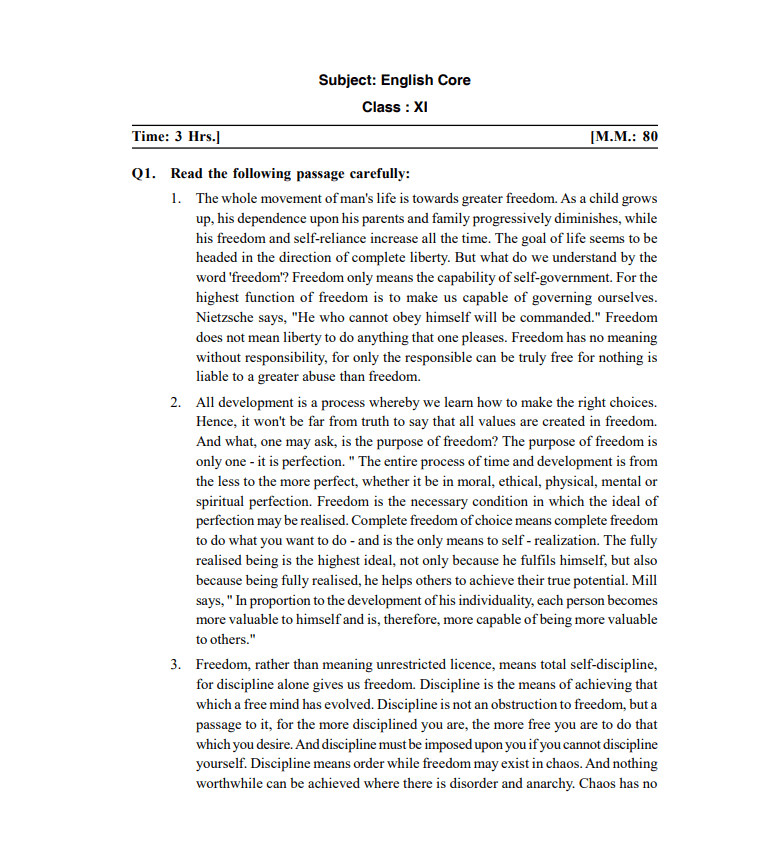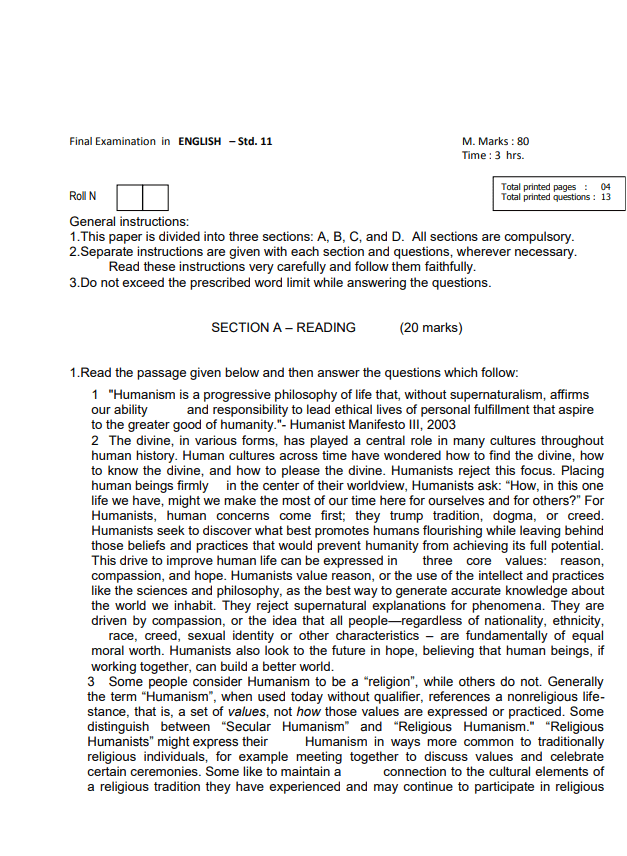Class 11 question paper of english : With the help of our website, which has an extensive collection of Previous Paper of Class 11 CBSE Board, you may successfully prepare for your Class 11 CBSE Board Exam. Get access to a large selection of past exam questions that have been carefully chosen to cover subjects related to the Class 11 CBSE Board course . Download practice tests in several formats, such as multiple-choice questions (MCQs) and descriptive questions, to help you prepare for exams and increase your confidence. With the help of our platform, you can revise with concentrate and recognize important themes and question formulation trends. Get ongoing help and direction to help you prepare for and pass the CBSE Board Exam.



- Introduction : Class 11 question paper of english
- Download : Class 11 question paper of english
- Syllabus : Class 11 question paper of english
- Exam Pattern : Class 11 question paper of english
- Significance of Class 11 question paper of english
- Tips for Good Preparation : Class 11 question paper of english
- FAQs : Class 11 question paper of english
Introduction : Class 11 question paper of english
An introduction to the Class 11 English test usually includes a number of elements intended to assess students’ linguistic ability, comprehension, and literary analysis.
Purpose
Examining pupils’ proficiency in reading, writing, grammar, vocabulary, and literary analysis is the goal of the Class 11 English exam. It is a method for determining their degrees of comprehension and language ability.
Components
Test structure
Multiple-choice, short-answer, and long-answer questions are frequently included in test structures. Each segment may receive a different number of marks, and exams frequently have a time limit.
Exam Preparation
Students should review the required material, work through sample questions, hone their writing and reading comprehension, increase their vocabulary, and engage critically with literary literature.
All things considered, the Class 11 English exam (Class 11 English Question Paper) is a crucial instrument for evaluating students’ language skills, capacity for critical thought, and enjoyment of literature. It also offers insightful information about students’ academic achievement and areas in need of development.
Download : Class 11 question paper of english
| Title | Question |
|---|---|
| Class 11 English Question Paper 2018 | Click Here |
| Class 11 English Question Paper 2022 | Click Here |
| Class 11 English Question Paper 2023 | Click Here |
Syllabus : Class 11 question paper of english
Below is a breakdown of the Class 11 English syllabus (Class 11 English Question Paper) as per the CBSE guidelines:
Section A: Reading Skills
I Reading Comprehension through Unseen Passage: 18 Marks
1. One unseen passage to assess comprehension, interpretation inference and vocabulary. The passage may be factual, descriptive or literary.
2. One unseen case-based passage with verbal/visual inputs like statistical data, charts etc.
Note: The combined word limit for both the passages will be 600-750.
Multiple Choice Questions / Objective Type Questions will be asked.
3. Note Making and Summarization based on a passage of approximately 200-250 words.
i. Note Making: 5 Marks
- Title
- Numbering and indenting
- Key/glossary
- Notes
ii. Summary (up to 50 words): 3 Marks
- Content
- Expression
iii. Grammar and Creative Writing Skills (23 Marks)
Section B
II. Grammar: 7 Marks
4. Questions on Gap filling (Tenses, Clauses)
5. Questions on re-ordering/transformation of sentences
III. Creative Writing Skills: 16 Marks
6. Short Writing Tasks
Classified Advertisements up to 50 words. One out of the two given questions to be answered (3 Marks: Format : 1 / Content : 1 / Expression : 1)
7. Short Writing Task
Poster up to 50 words. One out of the two given questions to be answered.(3marks:Format : 1 / Content : 1 / Expression : 1)
8. Long Writing task:
Speech in 120-150 words based on verbal / visual cues related to contemporary / age-appropriate topic. One out of the two given questions to be answered. (5 Marks: Format: 1 / Content: 2 / Expression: 2)\
9. Long Writing Task:
Debate based on visual/verbal inputs in 120-150 words, thematically related to contemporary, topical issues. One out of the two given questions to be answered. (5 Marks: Format: 1 / Content: 2 / Expression: 2)
Section C
Literature Textbook and Supplementary Reading Textbook
This section will have variety of assessment items including Multiple Choice Questions, Objective Type Questions, Short Answer Type Questions and Long Answer Type Questions to assess comprehension, analysis, interpretation and extrapolation beyond the text.
IV. Reference to the Context
10. One Poetry extract out of two from the book Hornbill to assess comprehension, interpretation, analysis and appreciation. (3×1=3 Marks)
11. One Prose extract out of two from the book Hornbill to assess comprehension, interpretation, analysis and appreciation. (3×1=3 Marks)
12. One prose extract out of two from the book Snapshots to assess comprehension, interpretation and analysis. (4×1=4 Marks)
13. Two Short answer type question (one from Prose and one from Poetry from the book Hornbill), out of four, to be answered in 40-50 words. Questions should elicit inferential responses through critical thinking. (3×2=6 Marks)
14. One Short answer type question, from the book Snapshots, to be answered I n 40- 50 words. Questions should elicit inferential responses through critical thinking. Any 1 out of 2 questions to be done. (3×1=3 Marks)
15. One Long answer type question, from Prose/Poetry Hornbill, to be answered in 120-150 words. Questions can be based on incident / theme / passage / extract / event as reference points to assess extrapolation beyond and across the text. The question will elicit analytical and evaluative response from student. Any 1 out of 2 questions to be done. (1×6=6 Marks)
16. One Long answer type question, based on the chapters from the book Snapshots to be answered in 120-150 words to assess global comprehension and extrapolation beyond the text. Questions to provide evaluative and analytical responses using incidents, events, themes as reference points. Any 1 out of 2 questions to be done. (1×6=6 Marks)
Prescribed Books
1. Hornbill: English Reader published by National Council of Education Research and Training, New Delhi
- The Portrait of a Lady (Prose)
- A Photograph (Poem)
- “We’re Not Afraid to Die… if we can be together
- Discovering Tut: the Saga Continues •The Laburnum Top (Poem)
- The Voice of the Rain (Poem) •Childhood (Poem)
- The Adventure
- Silk Road (Prose)
- Father to Son
2. Snapshots: Supplementary Reader published by National Council of Education Research and Training, New Delhi
- The Summer of the Beautiful White Horse (Prose)
- The Address (Prose)
- Mother’s Day (Play)
- Birth ( Prose)
- The Tale of Melon City
Internal Assessment for CBSE Class 11 English Core
- Assessment of Listening Skills – 05 marks
- Assessment of Speaking Skills – 05 Marks
- Project Work – 10 Marks
Exam Pattern : Class 11 question paper of english
| Section | Competencies | Total marks |
|---|---|---|
| Reading Skills | Conceptual understanding, decoding, analyzing, inferring, interpreting, appreciating, literary conventions and vocabulary, summarizing and using appropriate format/s. | 26 |
| Grammar and Creative Writing Skills | Conceptual Understanding, application of rules, analysis, reasoning, appropriacy of style and tone, using appropriate format and fluency, inference, analysis, evaluation and creativity. | 23 |
| Literature Text Book and Supplementary Reading Text | Recalling, reasoning, appreciating literary convention, inference, analysis, creativity with fluency, Critical Thinking. | 31 |
| TOTAL | 80 | |
| Internal Assessment | ||
| Assessment of Listening and Speaking Skills | I. Listening II. Speaking | 10 |
| Project Work | 10 | |
| GRAND TOTAL | 100 | |
Significance of Class 11 question paper of english
The significance of Class 11 English Question Paper lies in their ability to serve as valuable study resources for candidates preparing for the CBSE Board examination. Here are some key reasons why these question papers are important:
Exam Blueprint Revealed:
The actual exam is modeled by these papers. You can learn a lot about the arrangement of the questions, the relative importance of the various areas on the syllabus, and even the degree of difficulty by carefully examining them. This enables you to customize your study and give priority to the subjects that need greater attention.
Improving Your Skills:
Using past year papers for practice is similar to taking practice exams in a real exam setting. You get to put your speed, accuracy, and conceptual understanding to the test in a virtual setting. This assists in determining your areas of strength and weakness prior to the exam, enabling you to improve your strategy and reinforce your comprehension of important subjects.
Building Exam Stamina:
The Class 11 CBSE Board exam may have a time limit, therefore success depends on your ability to manage your time well. You can improve your endurance and time management abilities for the test by using previous year’s papers. You can learn to pace yourself, prioritize questions, and stay away from becoming bogged down on any one problem by practicing in a timed environment.
Increasing Confidence:
Completing last year’s papers successfully boosts your self-assurance and eases exam anxiety. Observing that you can appropriately respond to questions validates your understanding and inspires you to keep trying. Your overall exam performance is significantly impacted by this positive reinforcement.
Finding Recurring Patterns:
Although the precise questions won’t be asked again, reviewing previous exams frequently identifies patterns in the subjects and question types that are asked again. This enables you to create focused strategies for answering the kinds of questions you might encounter on the actual exam by anticipating their types.
It’s like having a secret weapon when you use the Class 11 English Question Paper in your preparing approach. They sharpen your abilities, give you confidence boosts, and offer priceless insights, all of which considerably raise your chances of succeeding on test day.
Tips for Good Preparation : Class 11 question paper of english
Recognize the test and syllabus:
Visit the CBSE Board website (Class 11 English Question Paper) to download the official announcement and curriculum.
Recognize the format of the exam (number of sections, weighted scores, time allotment).
Learn everything there is to know about the subjects included on the curriculum for each area.
Create a Timetable and Study Plan:
Make a realistic study schedule with time allotted for each section based on the syllabus and your preferred method of learning.
Establish study times on a daily or weekly basis, and try your best to maintain them.
Be adaptable and make necessary changes to your plan, but consistency is essential.
Establish a Robust Base:
Pay close attention to the fundamental ideas in each area, paying particular attention.
Learn the fundamental, shortcuts, and approaches to solving problems.
Make Use of Educational Resources
Make use of top-notch study resources, such as online courses, textbooks, and coaching materials (if necessary).
Exam patterns and time management exercises can be learned by looking at previous year’s question papers and practice exams.
Consistent Practice:
Every day, complete practice questions from different sources.
Prioritize precision while progressively picking up speed.
Examine your errors and determine what needs to be improved.
By following these tips and dedicating yourself to consistent preparation, you can significantly increase your chances of success in the Class 11 CBSE Board Exam. Remember, the key is to start early, work hard, and stay focused on your goal.
FAQs : Class 11 question paper of english
Q1: What is the exam pattern for Class 11 English?
A1: The exam pattern typically includes sections on reading comprehension, writing skills, grammar, literature, and sometimes verbal ability.
Q2: How should I prepare for the reading comprehension section?
A2: Practice regularly by reading various types of passages and answering questions based on them. Focus on understanding the main idea, supporting details, tone, and author’s purpose.
Q3: What topics should I focus on for writing skills?
A3: Concentrate on essay writing, letter writing, report writing, and precis writing. Practice organizing your thoughts logically and expressing them effectively.
Q4: How important is grammar in the English exam?
A4: Grammar is crucial as it forms the foundation of language proficiency. Pay attention to grammar rules, tenses, sentence structure, punctuation, and vocabulary usage.
Q5: What are some common mistakes to avoid during the exam?
A5: Avoid neglecting any section of the paper, skipping instructions, or rushing through answers without understanding the questions. Double-check your answers for grammatical errors, coherence, and relevance.






